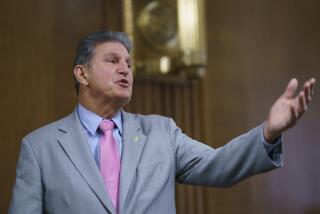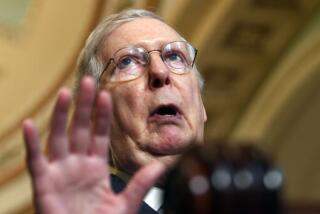Read Greenspan’s Lips
- Share via
Warnings about the budget deficit have been futile whimpers in a wind tunnel of false optimism during the past campaign year. But a new alarm Wednesday came straight from the horse’s mouth: Federal Reserve Board Chairman Alan Greenspan. The deficit is not some benign creature that can be put into the closet and forgotten, he said. It is a cancer eating away at the American economy.
Greenspan is more than just another economist spouting deficit theories. Greenspan barely veiled his threat to put the squeeze on the money supply and force up interest rates if the new Administration fails to cope with the problem. For some hint of what that would do to the economy, Greenspan’s talk to the National Economic Commission was immediately followed by the sound of thud, thud: the Dow and the dollar dropping.
The Fed chairman warned that the nation cannot just allow the deficit to work itself out through restrained spending and economic growth. It cannot be done. Greenspan declined to offer a formula for balancing the budget, although in the past he has proposed a combination of budget cuts and higher gasoline taxes. There are plenty of proposed solutions. The real question is whether Congress and the Administration are willing to take strong medicine to bring the deficit down.
Greenspan’s surprisingly blunt comments were reinforced by the pointed and appropriate remarks of former Reagan Labor Secretary William E. Brock III and Alice Rivlin, former director of the Congressional Budget office. Brock said, “Simply put, we are spending too much, borrowing too much, investing too little and saving virtually nothing.” Rivlin added that it is not possible to eliminate the deficit if defense spending, Social Security and taxes are untouchable.
All of which makes George Bush’s solution of a flexible budget freeze sound about as effective as administering aspirin to cure gangrene. Without new taxes or some adjustment in defense and entitlement programs, there’s no flexibility. A further $150 billion must come out of his first budget to pay interest on the debt. Interest payments have consumed just about $1 trillion since President Reagan took office. With so many huge expenditures declared off limits, as little as 12% of the budget remains to absorb a minimum of $35 billion in cuts. Congress will not go along with such blood-letting, nor should it.
Nor will Democrats in Congress take the lead in proposing new revenues. That must come from the Bush Administration, possibly in tandem with selected budget cuts and adjustments in some entitlement programs. The key is finding a way to break Bush’s no-tax pledge without seeming to break it--perhaps by maintaining present tax rates but finding ways to broaden the base.
Bush insiders say that they plan to begin intense budget negotiations with Congress as soon as possible in hopes of working out a deficit-reduction plan by June. But June is too late. One reason for urgency is the chance of a recession that would send the deficit soaring because of unemployment and welfare benefits and decreased tax revenues. The economy easily could absorb a modest tax increase now, but it would be imprudent and politically impossible to raise taxes after a downturn was under way.
After repeating his silly read-my-lips comment so many times, Bush may think that he comes out of the election with a mandate not to raise taxes. It was a catchy sound bite for the campaign. But Bush’s paramount responsibility now is to get some significant deficit reduction quickly. That will require a combination of domestic and defense budget cuts and new revenues, and a large dollop of old-fashioned presidential leadership.
So much for the Bush honeymoon. It’s Tension City from here on out.
More to Read
Get the L.A. Times Politics newsletter
Deeply reported insights into legislation, politics and policy from Sacramento, Washington and beyond. In your inbox twice per week.
You may occasionally receive promotional content from the Los Angeles Times.









